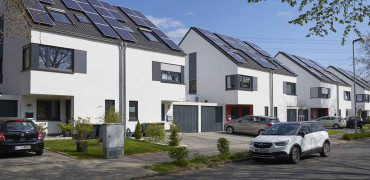The UK is at a critical juncture with the climate crisis and Keir Starmer has committed to provide nearly 12 billion of climate finance in order to continue along the appropriate path.
During the short time in which Labour has been in power it has made more green reforms than Rishi Sunak did in his entire tenure. In fact Labour´s ambitious intention is for the UK to be a lead in the reduction of emissions.
Sir Keir insisted the government would not "tell people how to live their lives" but the targets set are vital to the UK's future prosperity and energy security.
In order for net zero to succeed for the UK, it has to be a priority, a core one. But what contributions will each relevant government department make? The biggest source of emissions comes from transport. In addition both industry and housing are contributors, what will these departments do?
Our buildings are the largest source of climate emissions after transport
Bold moves from Labour
Since taking power in July, Labour has ended an effective ban on new onshore wind projects and pledged not to issue any new oil and gas exploration licences in the North Sea. In addition, closing the UK's last coal power plant in September. Bold moves.
Labour is promising to quadruple offshore wind generation in the next five years, undersea infrastructure will be required here, perhaps posing a contradiction to the Biodiversity net gain policy, a policy that declares any construction must not diminish the areas of biodiversity. Any expansion of offshore wind generation will of course impact. It will be interesting to see if this can be balanced and how!
Taxes on meat and dairy may be introduced if we are not able to reduce our consumption. Livestock production on a mass scale accounts for almost a third of human-caused emissions. Methane is a potent greenhouse gas that is responsible for half a degree of global warming. A return to local produce and farming on a small scale may be imperative.
Shadow energy secretary Claire Coutinho feels this is a hardship we in the UK will not welcome, making "already stringent carbon emission targets even higher" would require a "shift away from meat and dairy" and "less travel".
Make energy great again
One of the more ambitious policies is the proposal to establish a publicly owned clean energy company - Great British Energy, the goal here is to transform the UK's energy landscape heavily in renewable energy such as wind, solar and hydro.
The company's headquarters will be based in Scotland and paid for by a windfall tax on oil and gas giants. It will own and run clean power projects up and down the country.
The investment will be huge, a progressive intention to create 650,000 jobs across the country within 5 years and make the UK a clean energy superpower. A future industry investment as well as providing energy independence.
Keir Starmer: "Make no mistake, the race is on for the clean energy jobs of the future, the economy of tomorrow, and I don't want to be in the middle of the pack – I want to get ahead of the game".
Considering that our built environment is the largest source of climate emissions after transport, our building and infrastructure will have to have an altered emphasis in the future.
Building regulations are to be reformed in order to significantly cut emissions. Labour will enforce stricter standards in building codes, and will promote sustainable materials and renewable energy technologies.
Sustainability standards
With the promise to build 300,000 eco friendly homes every year, will the huge surge in construction not create an environmental cost?
Labour says not, each home must be built to the highest sustainability standards, minimal carbon footprints and maximum thermal insulation, smart energy management and renewable systems will be at the forefront.
Labour demands to introduce specialised programs aimed at architects, builders and engineers. Green construction will be the focus of education and training in order to produce a low carbon construction sector.
They say reaching net zero should be an opportunity not a hardship, but which will it be for not only us as a population but also our planet?
Kirsty Hammond is Publisher of Specifier Review




